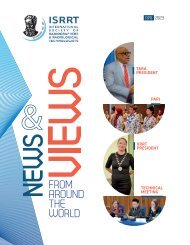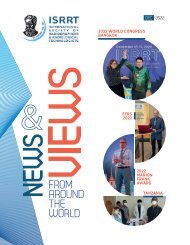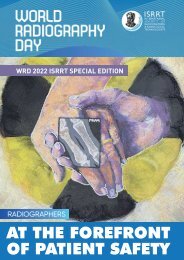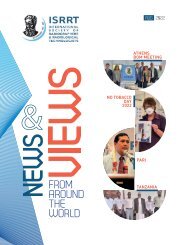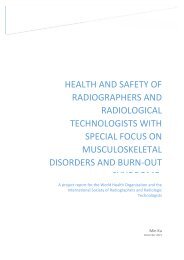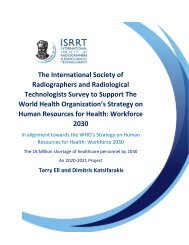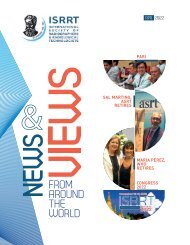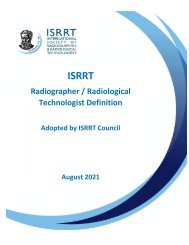ISRRT_COVID-19_book
You also want an ePaper? Increase the reach of your titles
YUMPU automatically turns print PDFs into web optimized ePapers that Google loves.
they were given appreciation gift packs and thank you notes 1 . Strong social support was<br />
evident throughout the duration of their placement.<br />
The importance of every radiography educator in nurturing the next generation of<br />
radiographers is undeniable. Clinical educators play a crucial role in boosting students’<br />
engagement in clinical education affected by the <strong>COVID</strong>-<strong>19</strong> pandemic. With the incoming<br />
generation Z students, considerations must be made to meet their needs. As independent<br />
active problem solvers, generation Z students are technologically integrated, but they have<br />
an increased risk of suffering from psychological distress 2 . Therefore, mental well-being of<br />
the students was a concern for the clinical educators throughout the placement duration.<br />
Furthermore, educators had to constantly create learning opportunities for students who had<br />
suffered loss of practicum due to the various restrictions 3 . This was a herculean task for the<br />
clinical educators who were already overwhelmed by the rising cases of transmission in the<br />
community. They must now educate students while working with minimum manpower and<br />
ensuring quick turnaround of the medical imaging services.<br />
While it may be expected for faculty in the IHL to be able to easily embrace the digital learning,<br />
clinical educators often struggle with such a paradigm shift in delivering education. Many<br />
were not prepared to deliver online teaching and learning and scrambled to come to grips<br />
with the practicalities of teleconference tutorials. This is a timely reminder to all clinical<br />
educators to start gaining more exposure to online teaching so that they can be more<br />
comfortable with their individual virtual teaching skillset when called upon. As if struggling<br />
with digital learning was not enough, clinical educators also had to grapple with teacher’s<br />
ethical dilemma – ‘failing to fail’ students. The fallout from failing to fail is too great as it can<br />
be a patient safety risk when we fail to fail 4 . However, failing a student is sensitive and<br />
constantly leads to ethical distress in the clinical educators.<br />
Clinical educators often emphasise on enduring relationships and social networks with the<br />
students and to fail a student can be challenging 5 . Nonetheless, authenticity and validity of<br />
the assessment can only be maintained through an objective evaluation of the student’s<br />
performance. Using evidence-based best practices to guide clinical educators’ teaching and<br />
evaluation would empower and increase their confidence in assessing their students’<br />
139




